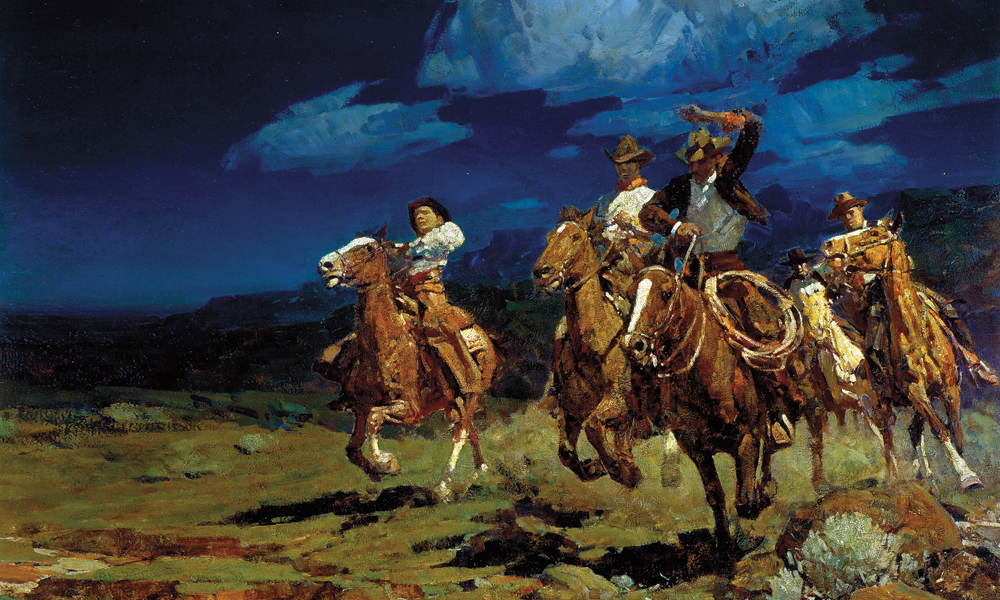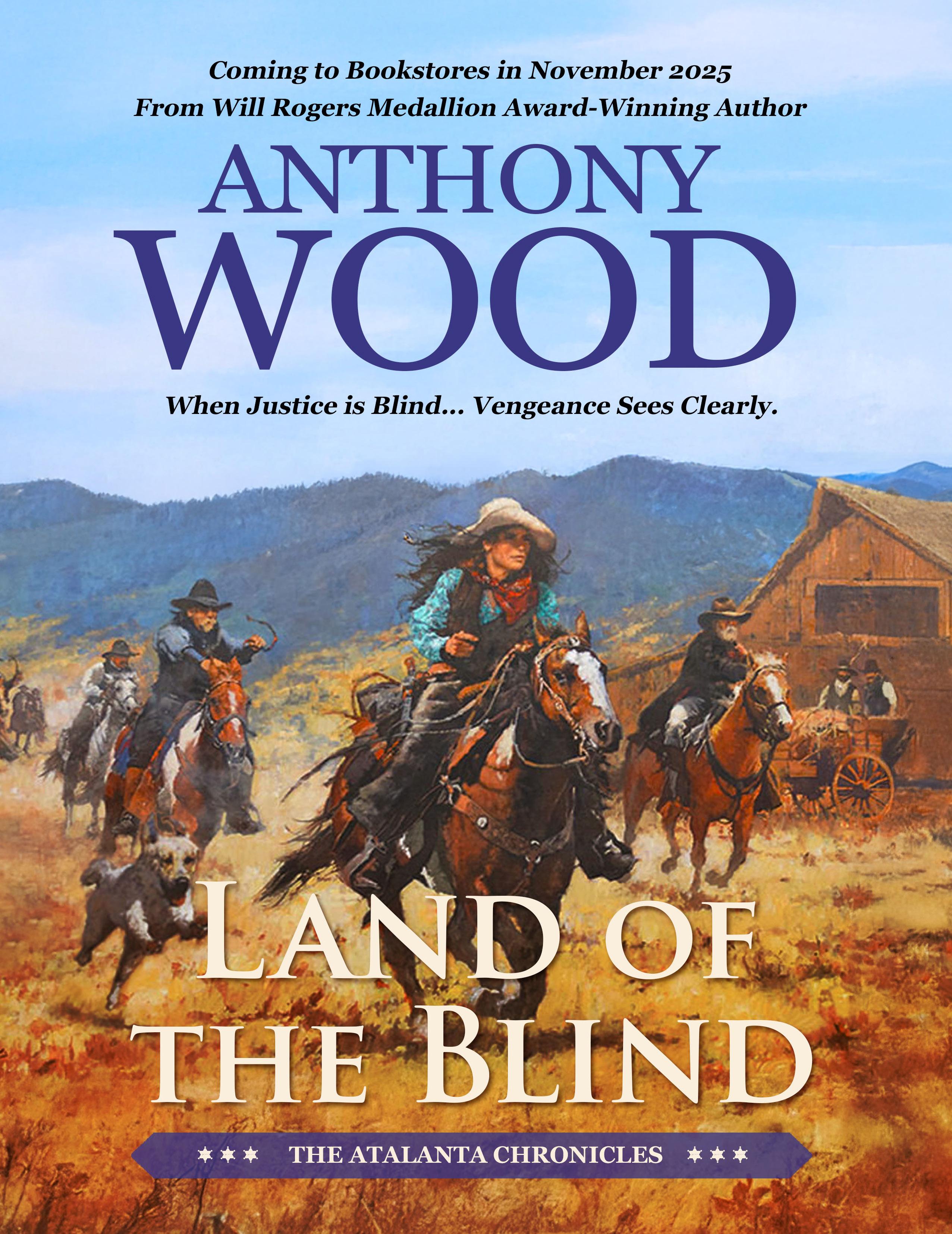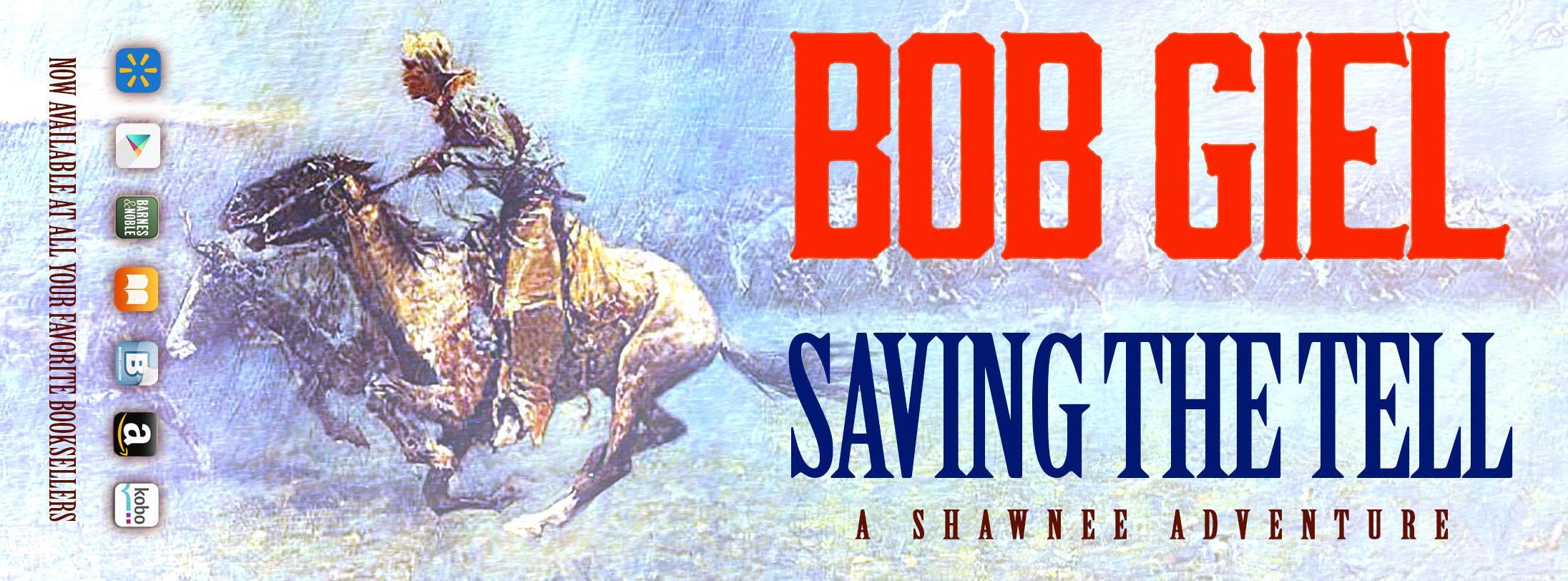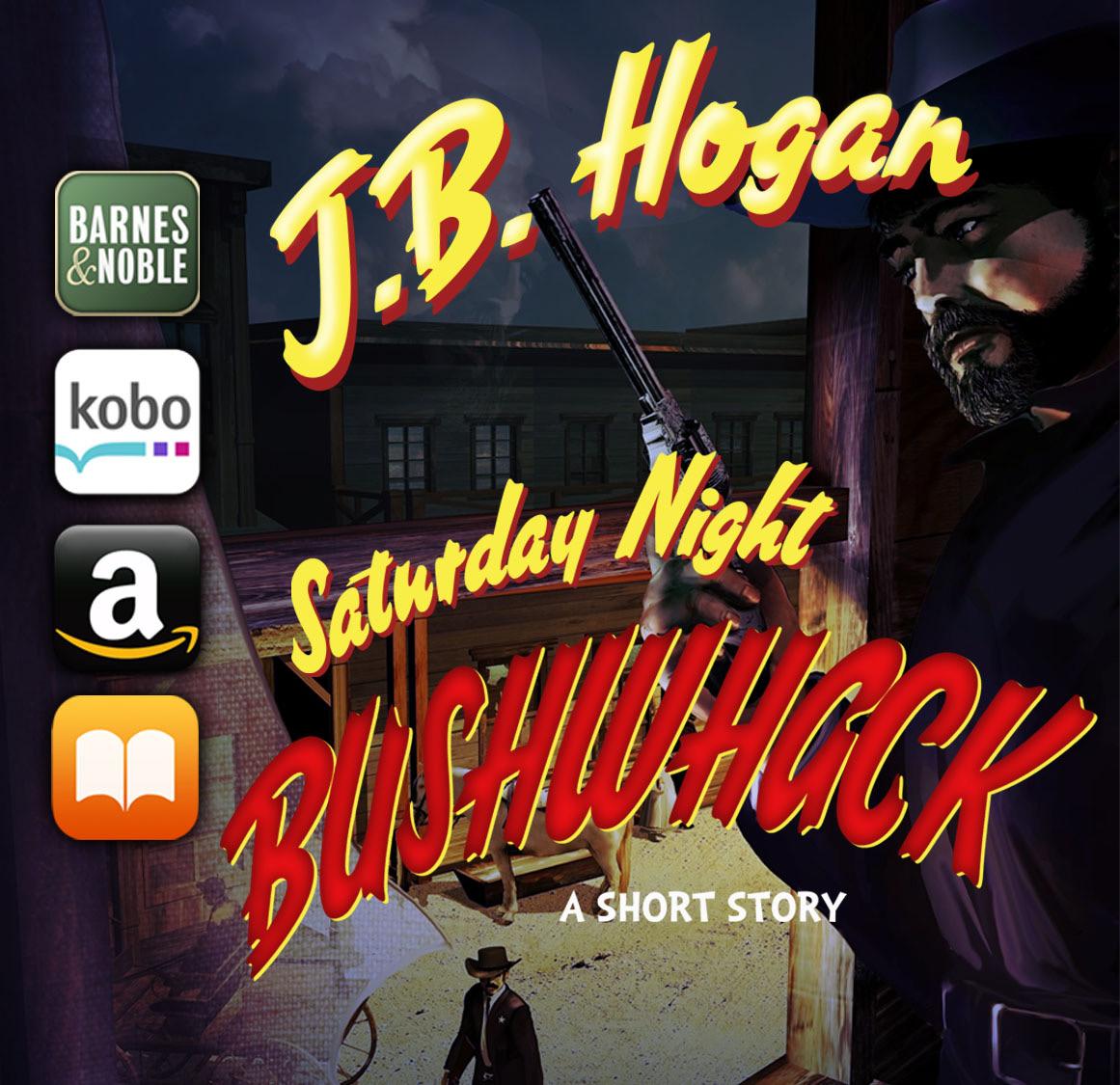
15 minute read
Die Quiet by Abigail Dotzler
“Of course, I didn’t go to his funeral. Jack McCall was my best friend!”
“Bold words nowadays,” I warned, wiping down the counter. They hung him over in Yankton a few months ago, but Nuttal & Mann’s was no place for anyone claiming to be McCall’s friend. I handed Wes another drink to shut him up. He was liable to start another gunfight, and I’d get caught in the crossfire, near certain.
Whiskey only loosened his tongue. “What’s so great about Wild Bill anyway?” He slammed his glass down, and I quickly wiped away the stray drops that landed on my counter. “So he was a flashy shot? Big deal! Certainly didn’t help him when Jack—”
“You’re talkin’ stupid, Wes.” I filled his glass again and left the half-full whiskey jug on the bar. He couldn’t run his mouth with his lips locked around a bottle. In the corner, a gaggle of mean characters threw down their cards, causing the makeshift chips to chatter against the wooden table. On occasion, the biggest one of the bunch would glance over his shoulder at Wes’s hollering.
“I ain’t, Tom.” Wes drained the glass. “Hickok weren’t even that great at poker. Jus’ lucky.”
“He certainly weren’t lucky the day McCall shot him.”
Wes didn’t hear me, as he was too busy ranting about how Hickok shot McCall’s brother down in Abilene. He had started out conversational, but with a few more gulps of firewater, he was shouting louder than the thunder that rattled the windows. The glances from the corner came more frequently, and I thought it best to whisk the jug off the bar, but
Wes grabbed my wrist and poured himself another glass. He jumped from his barstool and planted his boot on my freshly polished counter.
“What are you doin’, Wes?” I tried to push him back onto the stool but he fought me off, climbing fully onto the bar.
“Wild Bill Hickok,” he announced, “was a no-good, murdering bastard.” The men in the corner dropped their cards again, but no bets were exchanged.
The jug slipped from his hand, and the air in the saloon shattered with it. The legs of a chair screeched against the wood flooring, accompanied by a chorus of lightning strikes and thunder, as the largest man at the poker table rose to his feet. An overly large walrus mustache framed his tight frown, and his small eyes narrowed. I stepped away from Wes, silently willing him to get out of my saloon before more bullets flew.

The man stepped up to the bar. Just standing, he was nearly eye level with Wes. A pair of Colts slung low around his hips with grips out. Cross drawn, like Hickok wore ’em. He’d been a regular in the last few months, but not very talkative. I didn’t know his name, but I knew his drink. I spun around to grab a bottle from the top shelf.
“Bill Hickok was my friend,” he told Wes.
Wes wobbled, slipping on spilled whiskey and pottery shards, he slurred his words, “Then I reckon you’re a murderin’ bastard too.”
I slid the high-priced bourbon to the man. “Gentlemen, please.” Nuttal & Mann’s couldn’t afford another shooting.
They ignored me. “You wanna say that again?”
The man reached for his right pistol.
“Gladly!” Wes dragged an accusing finger across the saloon, hitting each patron. “You’re all a bunch of murderin’ bastards and cheats, just like Hickok. An’ I’ll fight any man who thinks Jack weren’t in the right.” He turned his back on the saloon and paused to regain his precarious balance. “I’ll fight you, Tom.”
“Me?” I jumped back, bumping the stack of liquor bottles. They rattled my death toll. Even drunk and seeing double, Wes’s aim was true.
“You,” he repeated. “If Hickok were such a great friend to ya, Tom, you oughta be willing to fight me over it.”
“I ain’t gonna fight you, Wes.”
Wes struggled to draw his pistol. He yanked the out of the man’s Colt, and Wes’s pistol clattered to the ground.
Wes wobbled, not unlike in his drunken stupor, but his head was a mess of blood and brains. Less of a head and more of a crater at the end of his neck. Shards of his skull scattered across the floor like poker chips from a thrown table. Ruby blood splattered on the floor and counter, and Wes’s body collapsed. A corpse.
Not again, not again. What would I tell Nuttal and Mann? I only wanted a quiet life, and gunfights seemed to follow me like flies following the uglier side of a horse. Miriam and Hickok and Wes. One death was a coincidence, but Nuttal and Mann wouldn’t forgive this one. I just wanted to tend the bar and polish the counter. Not much, but a quiet, honest grip repeatedly, but never undid the leather strap holding it in the holster. “C’mon, Tom.”
I glanced at Hickok’s friend. His drink sat on the bar untouched, and he drew his gun with ease.
“Gentlemen,” I tried again.
Wes yanked so hard that he lost his balance and crashed off the bar. The man towered over him, aiming between Wes’s eyes.
Wes struggled to his feet. “I ain’t going quietly, ain’t going without a fight.”
The man’s pistol followed Wes’s posture.
Wes finally found the strap and pulled his gun. He aimed for the man’s heart.
“Gentlemen, please.” Not another gunfight. I couldn’t have another gunfight.
Wes’s aim was true, but the man was faster. The shot burst through the already shattered air, and the bullet burrowed into the bar. Smoke drifted lazily life. And now another man was dead on the floor. Dead. On the floor with his life seeping into the floorboards and his blood staining my freshly polished counter.
“You ain’t gonna stand for what’s right?” The man leveled his gun at me. The world swam as tears flooded my eyes. A deafening click bounced off the bar and the bottles and Wes’s body.
“I…I…” I stumbled over my words and struggled for the right response. But how could I think, staring down an 1860 Army revolver? I couldn’t die like this. A quiet life, a quiet death, all I wanted. I didn’t survive Gettysburg just to be shot down in Deadwood.
“Well?”
I couldn’t die like this. Not another gunfight. There. Nuttal and Mann stashed a derringer under the counter. Deadwood had a reputation, nothing like Dodge, but with Hickok gone now….
“Do you want to join your friend, the drunk?” my fault just the same. I gave her too much bourbon, gave that outlaw too much firewater, gave Wes too much firewater. Miriam was dead. This man was dead, and his blood was literally on my hands.
I grabbed the derringer with both hands, threw back the hammer, and fired at the man. The bullet caught him in the throat. His exclamation was drowned by the blood frothing in his mouth. His knees buckled, and he crumpled, landing on top of Wes’s body.
Not again, not again. I dropped the derringer. “A doctor, someone get a doctor,” I called to those remaining in the saloon. A good number cleared out after the first shot. “And the sheriff.” I looped around the bar and dropped to my knees in front of the man. His chest rose and fell with every hard-won breath. His hands circled his own throat, trying to staunch the bleeding, but he’d lost too much strength already. The pressure wasn’t enough.
The batwing door swung open, and Sheriff Bullock, drenched in rain instead of blood, walked in. He doffed his hat and shook the storm out of his hair. He froze just inside the door, and we locked eyes.
“Tom?”
My hands were still locked around the man’s throat. I jumped to my feet and wiped his blood on the apron tied around my waist. “It ain’t what it looks like, Sheriff.”
“Looks like you killed that man, Tom.” Bullock approached me, hand on his gun.
“No—I mean, yes, but I—I mean, I had a reason.

Not again.
I wrapped my own, stronger hands around his neck. Hot blood pooled between my fingers and slicked my palms. In the War, I tried this a hundred times—threw down my gun and rushed to my compatriot’s side. It never worked.
Fear widened the man’s eyes, not having the chance to die quietly. I stole a peaceful death from him. He tried to pull my hands from his throat.
“I’m trying,” I whispered. Gore drenched his shirt. He moaned, and bloody bubbles popped on his lips.
“I’m sorry, I’m trying.”
I failed. His last breath shuddered through his body, and his eyes rolled up in his skull.
Thunder crashed again, shaking the saloon’s windows and marking the end of the man’s life. I stole a quiet death from him, and I never learned his name. I didn’t save him, like I didn’t save Miriam. It was
It weren’t purposeful, sheriff.” I opened my stained hands to the remaining men. They shied away from me, or from Bullock, and shuffled back to their poker game, carrying on like there weren’t two bodies and gallons of blood on the floor just a handful of feet away. Mean men like that wouldn’t deal with the law, and no one in Deadwood would defend me.
“Come on down to the jail with me, and we’ll sort this out, Tom,” Bullock said.
I followed him through the rain. I raised my hands to the storm, hoping to wash the blood off my palms.
“Quit that now,” Bullock ordered. “You look like a lunatic.”
I tucked my still-stained hands into the pockets of my apron. The streets were empty. No one in his right mind would go out in this storm. Guess that made Bullock and I both lunatics. Miriam called me a lunatic when I moved out this way. She called me worse when I failed to strike gold. I never wanted the headache of a goldmine anyway, just a bar and a rag and a quiet life. She visited with that husband of hers, thinking I’d struck it rich from some miscommunication in a letter. She were disappointed, but her husband were angry. And he shot her. Right there in my shack. What could I have done but kill the bastard? He had no one waiting for him, and Miriam and I only had each other. My shack was far enough from town that no one saw me dig two graves.
“It weren’t my fault, Sheriff,” I said. He pushed me into a cell and locked the barred door.
“I’m sure it weren’t, and Judge Bennett will decide what to do with you. In the meantime, Percy Shield has no want of friends who’d be all too happy to avenge him.”
“Sheriff, I’m telling you—”
“It weren’t your fault, I know. But Shield’s boys ain’t gonna see it that way.” Bullock dropped the key in his pocket. “Tryna keep you safe, Tom.”
“It weren’t—”
He shook his head and walked out of the jail, the door slamming behind him. It weren’t my fault, and this was no way to die quietly. The jail was more secure than my shack, but anyone could find me here. No one ever visited my shack, and I doubted a soul in Deadwood knew where I lived. It was quiet out there. This jail wasn’t quiet.
Within the hour, I’d spoke to no less than three of Bullock’s deputies. I gave them the same story I gave Bullock, and they gave me the same placations. By sundown, I almost believed them that the jail was safer and that Judge Bennett would sort everything out. But Bennett couldn’t sort any of my troubles. A man couldn’t wash the blood from my hands, couldn’t give Miriam and Wes and Hickok the quiet, peaceful deaths they deserved.
When dark fell, the deputy on duty brought me a bucket to wash up with.
I waved him away. “Leave it. Too late now, the deed is done.”
“You’re stinkin’ the jail up.”
“Then let me go. Let me die quietly in my shack.”
“You ain’t gonna die, Tom,” the deputy said. “The doctor already checked ya for fatal wounds, and you don’t got a single one.”
I splayed my hands. “It’s too late,” I repeated. The deputy shrugged and left with the wash bucket. He never came back.
I paced the jail cell and worried about my bloody hands. It weren’t my fault, but Lord knows if Bennett would see it my way. He might lock me up or put me to work on the railroad or hang me for all the trouble. Someone would have to find my shack, to get my things and bring them for auction. And what if they found Miriam? Oh, surely I were a dead man walking. If Bennett hadn’t hung me by then, he’d hang me when they found Miriam, near certain.
What could I do?
The deputy had left, and I didn’t know how to break out of a jail cell. I weren’t the mean sort that knew his way around a lock. I could barely fire a pocket pistol, and my aim were only accurate when I didn’t mean it to be. Doomed! I was doomed. The jail were safer, but I didn’t want to face Judge Bennett and his noose. All I wanted was a quiet life, a quiet death.
None of this violence. Not another gunfight.
“Tom Kade?” A short kid carrying a shotgun crept through the door. A posse of burlier men followed. Shield’s boys. And there were no deputies in sight. I told Bullock my shack was safer, no one would have ever found me there.
The kid approached the cell. “Mister Kade, are you crying?”
“No, of course not.” I swiped my sleeve over my eyes. The kid’s sandy hair and crooked nose rung a bell in the back of my tired brain. “You’re Wes Porter’s kid?”
“Yessir.” He shifted his grip on the shotgun, and his eyes dropped to his mud-caked boots. “We’re here to, uh, we’re gonna break you out of here, Mister Kade.” His head rose again, and he aimed at the lock of my cell.

Bennett would hang me, near certain. Wes’s kid gave me the escape to my shack I needed. I could die quietly, dig myself a grave next to Miriam and lay down, peaceful.
The kid squeezed the trigger. Shot and metal exploded from the lock, and the deafening boom ricocheted between my ears. The barred door swung slowly open with a squeak that would have been head-splitting if the shot hadn’t already carved my head in two. I stepped out, and two of the kid’s posse grabbed me roughly by the arms.
“This is him?” one asked the kid. He didn’t wait for an answer before jostling my arm and hollering in my ear, “You’re Tom Kade?”
“It’s him,” the kid said, and I nodded.
“You killed Percy Shields,” another man said. A coil of rope rested on his hip. He fidgeted with one end, wrapping and unwrapping it around his wrist.
“It weren’t my fault.” But I didn’t protest further. I didn’t squirm in their arms. I told Bullock my shack was safer.
The two men led me outside. The rain had stopped, and mud puddles spotted the dirt road. The posse dragged me east, out of town, up a steep hill, and into a secluded forest, but they couldn’t possibly know where my shack was, where Miriam was. I tripped on a root, and Wes’s kid prodded me in the back with his shotgun. Three miles deep into the woods, the tree line broke around a clearing. A decrepit shack sat in the center. Two unmarked gravestones stood vigil at the far edge of the clearing. The man with the rope began to uncoil it while the other two pulled me to a tree. The lowest branch, about twenty feet high, stretched over the mossy forest floor, weighed down by a bird’s nest.
“Sorry, Mister Kade.” The kid sadly smiled at me. “My father….”
I nodded.
I understood.
Shield’s boys tied the rope into a noose and tossed one end over the branch. The bird’s nest tumbled to the ground. I shifted my gaze to my shack and the graves.
I didn’t cry as they slung the noose around my neck. If I were to die, I’d die quietly.
Before she could write, Abigail Dotzler would hand her mother a pen and paper and dictate stories, insisting that her mother transcribe her words exactly. Though she grew up addicted to fantasy novels, the American West called to her, and after seeing Tombstone, she fell in love with westerns and promptly filled her bookshelves with Wyatt Earp biographies and Louis L’Amour novels. She studies Creative and Professional Writing at the University of Wisconsin-Whitewater, where she serves on the editorial staff of The Muse, the university’s literature and arts magazine. When she isn’t scribbling her stories or reading the classics, she loves to take long walks in the woods and wander through museums.










